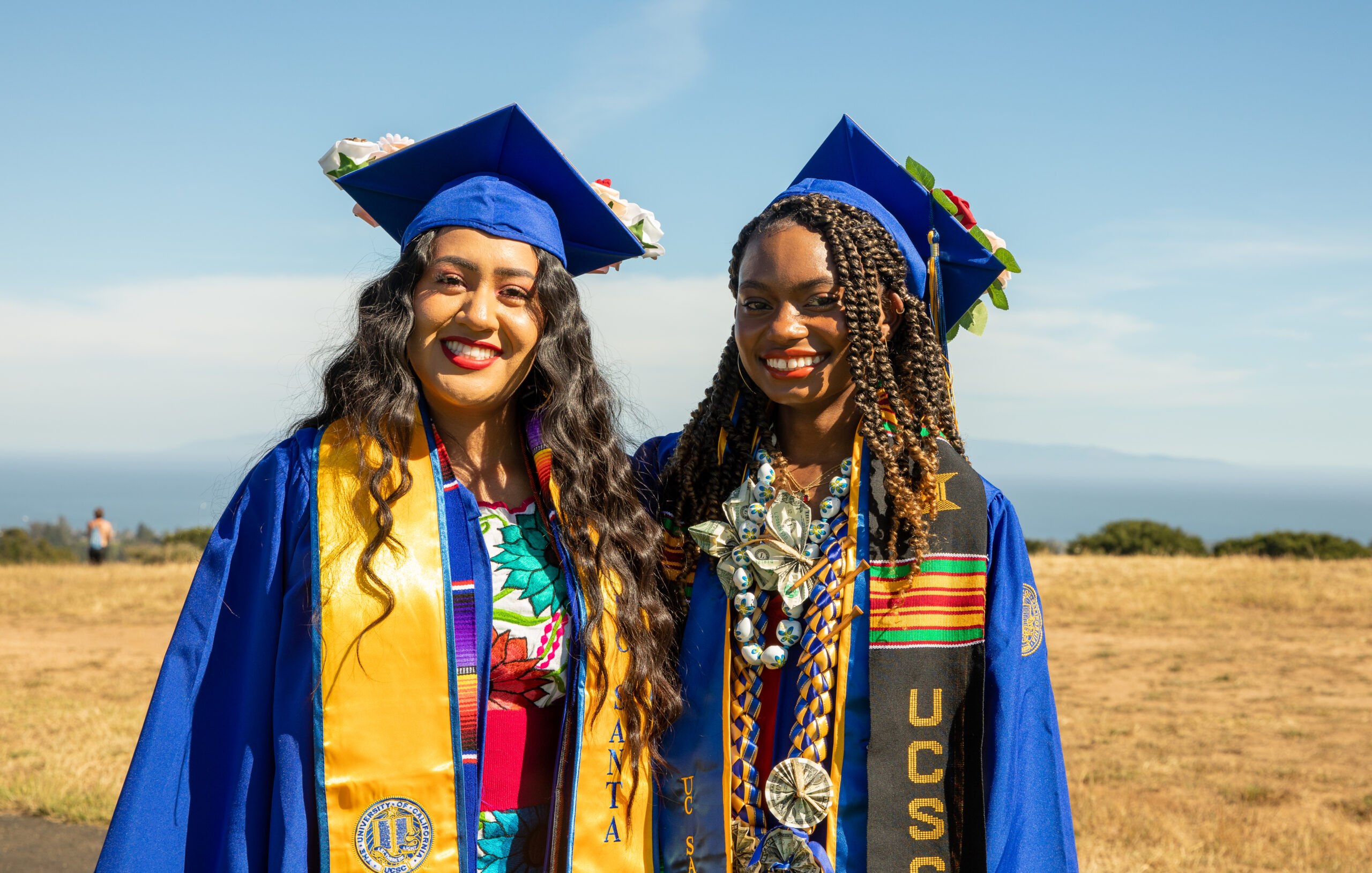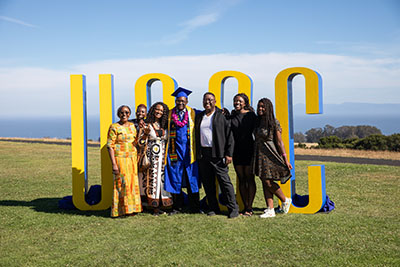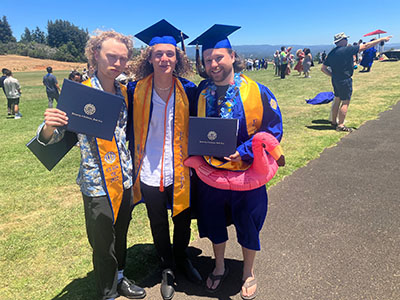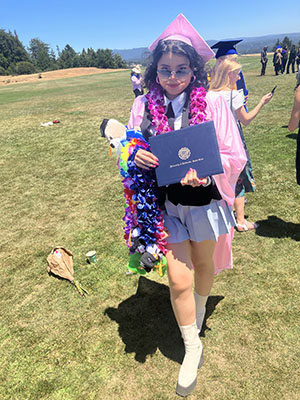Campus News
Joy and perseverance
Commencement week was a grand celebration that included Slug Crossings, heartfelt speeches, cap tossing, photo ops, and accessorized cap-and-gown outfits. Graduates spoke of the challenges they faced on the way, savored time with their families, and discussed future plans.




With laurels of dollar bills, gigantic neckties and oversized footwear, graduating UC Santa Cruz students sought to reflect the distinctiveness of their campus experience with personal touches.
Each graduate can share stories about obstacles, perseverance and success—and about the family and friends who provided help and support along the way. Thousands of Banana Slugs became alumni by earning their degrees and marking the start of a new chapter in their lives.
Commencement 2022 was a combination of virtual and in-person experiences. Virtual commencement launched on June 9 on the commencement website, while Slug Crossing, the campus’s in-person commencement ceremonies, ran from June 9–12 on the East Field.
Many of those receiving graduate and undergraduate diplomas have been at UCSC during a pandemic that forced a prolonged period of remote learning as well as the devastating CZU Lightning Complex fire that caused extensive damage in Santa Cruz County in 2020, and forced a campus evacuation.
Celebrate the Slugs
Hundreds of family, friends, students and employees offered their congratulations to members of the graduating class. Check out the message board.
“Your journey through UC Santa Cruz, from your first moment on campus to this commencement today, has been unique,” Chancellor Cynthia Larive said. “Among today’s graduates are tomorrow’s filmmakers and linguists, biologists and musicians, teachers and engineers, entrepreneurs and public servants. We celebrate your many accomplishments during your time at UC Santa Cruz, and we look ahead with anticipation to everything you may do next.”
Roughly 5,000 UC Santa Cruz students earned undergraduate and graduate degrees for work completed during the 2021–22 academic year.
Miguel Zacarias (Porter, ’22, film/psychology) walked across the East Field on Friday while wearing a graduation outfit that his family accessorized to include folded-up five, ten, twenty and fifty dollar bills, some of them woven into a pale green crown he wore on his head, others turned into garlands and a necktie.
His family stayed up late into the night folding those graduation cash gifts into items of clothing.
“My parents came from Riverside to be here,” Zacarias said. “The rest of the family came from Sonoma. My heart was just beating when I saw them. It is so nice to have a big crowd of people supporting you.”
Thomas Robinett (Porter, ‘22, film and sociology) looked like a one-man beach party, posing for photographs while wearing an inflatable floatation device shaped like a pink flamingo. “This represents my lifeline, my family, who helps me stay afloat with their words of encouragement and love.”
“Great metaphor,” said one of his friends, Sean Stubo (Porter, ‘22, film), who pointed to Robinett’s sandaled feet. “He flip-flopped it!” Stubo said.
Nearby, Andrea Duran (Porter, ‘22, critical race and ethnic studies) towered over the grass in her big white boots. “These boots add height, excitement, and a little risk,” Duran said, noting that the footwear increased her chance of falling on the uneven field.
Duran said her outfit showed confidence as well as authenticity. “I am first generation,” she said proudly. “Both of my parents are migrants from Central America.” Though she started out feeling uncomfortable in higher education, “I was able to meet people who shared my identity and create spaces where I felt comfortable. And my parents encouraged me to keep going.”
Now that she has finished her studies at UCSC, she is looking into masters programs in public health and community education.
Those Slug Crossings were livestreamed so well-wishers at home could join in. Many participants added a personal touch by including vivid photos, aphorisms and enthusiasms. Torrey Delphine Brownell, receiving a B.S. in biology, held up a large white and silver cat. “I don’t know where I’m going from here, but I promise it won’t be boring,” wrote Brownell, slightly paraphrasing a famous quote by the late rock legend David Bowie during his 50th birthday bash.
Following in the footsteps of John R. Lewis
Christina Blake (‘22, John R. Lewis, political science and government), an undergraduate teaching assistant and residential advisor, had galvanizing words at the first commencement ceremony held for the graduating students of the newly rededicated John R. Lewis College, in memory of the late leader, activist, and organizer whose bravery and conviction helped pave the way for the Civil Rights Act of 1964 and the Voting Rights Act of 1965.
Lewis later served 30-plus years in the House of Representatives, where he became known as the “conscience of Congress” for his commitment to justice and equity.
“You may not know that Congressman Lewis actually lost in 1977 when he ran in the Georgia special election,” Blake said. “Despite his initial defeat, he never gave up or stopped his fight for justice and equality, and just under a decade later entered the House for the first time. All of this is to say that while you may be faced with adversity as you pursue your passions, persistence will guide you, and I hope you take some time to reflect on how you can continue to challenge systemic racism and anti-Blackness on every level.”
A stellar speaker
Astronomy and astrophysics Ph.D. recipient Amanda Quirk, one of the distinguished speakers at the Grad Division festivities, established herself as a bonafide Slug star this year.
In March, she won the UCSC Grad Slam at the Kuumbwa jazz venue in downtown Santa Cruz, which came with a $3,000 prize. In May, she came in second in a field of 10 contenders at the UC-systemwide Grad Slam finals. She wowed judges with her lightning-fast presentation, “The Tale of Two Galaxies: Studying How Galaxies Change Over Time.”
She emphasized shared pride, teamwork, and persistence during the Graduate Division commencement ceremony. About 240 grad students participated.
“Hearing about the projects of other students flairs up my impostor syndrome at times, but it is always alleviated when other grads show excitement about my own work and remind me that we all belong here,” she said.
“The graduate community is highly collaborative and supportive,” Quirk continued. “We read each other’s grant proposals, share class notes, celebrate each other’s victories, and listen to each other vent. The graduate students at UCSC prove you can support one another while simultaneously doing groundbreaking work.”
“They say graduate school is a marathon, not a sprint,” Quirk said. “Perhaps a more accurate description is that it is a sprint the length of a marathon.”
An essential part of history
Merrill College Provost Elizabeth Abrams reminded those in the audience that they are part of campus history: “A little bit of background: You are graduating 50-plus years after the first commencement celebrated by what was then a brand-new Merrill College,” she said.
Merrill was born in 1968, “a historic year of war, protest, and direct action by young people who had educated themselves into believing that if change was going to happen, they would have to be that change,” Abrams said.
“We have been told by those who helped found the college that the defining question at Merrill in those early days—the question asked by students and faculty alike—was, ‘What is my relationship to the revolution?’ In other words—what role do I play, what part is my part, in the making of our unfolding history?”
Stirring words at Oakes
This year’s ceremony at Oakes College recognized Carlos Lucatero (Oakes ’22, Latin American and Latino studies and politics [double major]), recipient of this year’s J. Herman Blake Award, which goes to graduates who best exemplify the founding college provost’s commitment to social service and justice. Lucatero has worked as an Oakes Peer Mentor, Oakes Senate Chair, and Oakes core course assistant, and served on the Oakes Student Life team.
Lucatero (who uses the pronoun “they”) spoke candidly about early obstacles in college, and how they were able to weather the difficult times.
“Quite honestly, I did not think I’d make it here,” Lucatero told the Oakes crowd. “In my first quarter at UC Santa Cruz in 2018, I was sure that I wanted to transfer or drop out. Back in high school, I was a big fish—student body president, drama club, two-sport athlete—yet starting at Santa Cruz, I had nothing.”
Lucatero recalled the first few weeks of college, sitting in the dining hall, or hiding out in a dorm room.
“I was scared and alone,” Lucatero said. “I was terrified that this would be my life for four years. But something brought me out of my shell: the Oakes College Core course.”
“It was in that class of fellow Oakes first years where I felt myself come into my own as a college student,” Lucatero continued. “It’s where I met some of my closest friends to this day, and where I realized what I wanted to do with my life.”
In Core, Lucatero read texts by radical thinkers like the late American scholar of Chicana cultural history Gloria Anzaldúa, who taught at UC Santa Cruz and received a posthumous doctorate from the campus in 2005, and Angela Davis, activist, author, and distinguished UC Santa Cruz professor emerita.
“But most importantly, we were able to have open and honest conversations with each other about our life experiences and how they shaped us,” Lucatero said. “Core was a space for opportunity—where I could be as brown as I wanted, and as queer as I wanted. Where I knew I could learn from my peers about how to be a better ally, a better activist, a better friend, and a better person.”